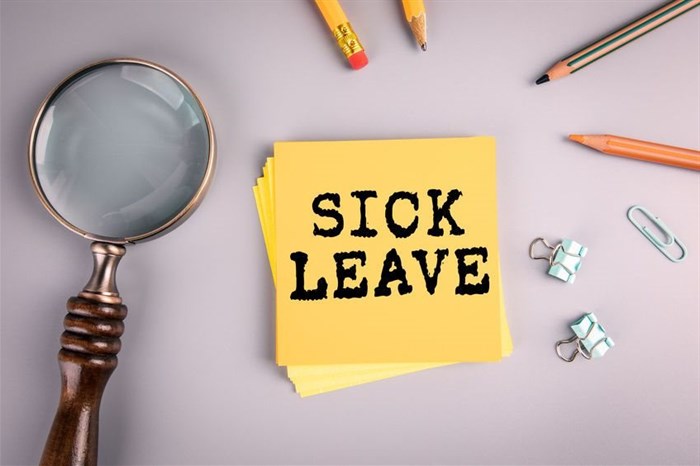"Honestly, I was sick as a dog, but felt so much better after talking some meds, to the point of going to town with a friend and, can you believe it, we ended up joining a march! And that is the honest reason why you saw me on television when I told you I could not come to work because I was sick!"
Abuse of sick leave is neither novel nor rare. When revellers are having a blast in the wee hours of the morning and one of them bemoans the fact that they must report for work in a couple of hours, chances are someone will suggest that they just book off sick the next day. Reports show more than 145 countries in the world provide paid sick leave as an employee entitlement.
According to an article on Hello Flamingo, abuse of sick leave is calculated to cost companies in the United States around $1,685 per employee annually, for a total cost of $225bn per year. In South Africa, the Occupational Care South Africa revealed recently that this kind of absenteeism cost the economy between R12-16bn per year. The Human Capital Review noted that it could be higher than this, reaching almost R20bn annually. It seems clear that employers have reason to take a dim view of sick leave exploitation.
Sick leave itself is not a new phenomenon. The tombs of ancient Egypt were not only built by slaves but also by skilled artisans who slaved away to construct and decorate the burial places for kings. Texts (papyrus, not WhatsApp) from the New Kingdom Period, 1550–1070 BCE, show that these craftsmen were still given rations and other benefits during periods of illness where they were unable to work. According to an article by a postdoctoral fellow at Stanford University, Anne Austin, it seems that even centuries ago there was an appreciation of the benefit of taking care of sick workers.
Various studies have shown that:
- Workers without paid sick leave are less likely to obtain preventative medical care, including cancer screenings and influenza vaccinations.
- Employees who can take paid sick leave are less likely to experience workplace injuries.
- Taking sick leave reduces the risk of spreading illness, whether it is through employees staying at home and not infecting their colleagues or parents staying at home to take care of sick children and then not sending the kids to school where they infect other children. Almost a third of surveyed employees have indicated that they have contracted the flu from a fellow employee.
Taking care of the sick is a central tenet of many cultures and religions. Research confirms that the state, employers and employees alike benefit from the provision of paid sick leave. But should this extent to our rowdy party-going colleague who heroically resists the urge to take the next Uber home so that they can be at work on time the next day? Should we be more magnanimous when someone uses a sicky to attend a political party rally, or a rugby match? Will the courts require us to be less uptight about how we view dodgy sick leave claims, and expect us to cut employees some slack if they call in sick rather than ask for a day’s leave when they don’t want to come in to work but are not truly sick?
Tania Broughton 24 Jul 2023 What the courts say
In two recent decisions, our courts have come down decisively on the side of showing no tolerance for sick leave abuse. In both the 2021 Labour Appeal Court judgment (Woolworths v CCMA and others [2021]) and the 2023 Labour Court decision (SARS v CCMA & Others), the courts reviewed and set aside arbitration awards handed down by the employment tribunal where the tribunal wrongly concluded that the employees ought not to have been dismissed.
The message from the courts is clear: dishonest conduct destroys the relationship of trust between employer and employee. Where employees advise employers that they are not fit enough to come to work but then partake in other activities that belie their inability to report for duty, such conduct is dishonest and warrants dismissal from service. As stated by the LAC:
"The employee acted dishonestly in absenting himself from work on the basis that he was too ill to perform his duties but then travelled for at least an hour to support his local rugby team, knowing full well that he would be paid for the day."
And:
"This lenient approach to dishonesty cannot be countenanced. The third respondent held a relatively senior position within the organisation of the applicant at Humansdorp. He was palpably dishonest, even on his own version. He expected to get away with the enjoyment of attendance at a rugby match on the basis of claiming sick leave and then enjoying the benefits thereof. This is dishonest conduct of a kind which clearly negatively impairs upon a relationship of trust between an employer and employee. It is clear that the relationship of trust as a result of his initial unreliability and now dishonest conduct had broken down..."
Aadil Patel and Dylan Bouchier 5 Apr 2022 False impressions
Employees often seem to labour under the misapprehension that the employer merely has to accept their absence due to their stated illness and that it is almost impossible for the employer to show that they were not ill, in fact. This perception is clearly wrong and is likely to cost mistaken employees their jobs.
When evaluating the reason the employee provided for not attending work against the employer’s reason for concluding that the employee malingered, a hearing chairperson, tribunal arbitrator, or judge will consider the two conflicting versions in the light of the probabilities. While it will typically be difficult for an employer to show conclusively that an employee was not genuinely sick, that is not the test; the employer merely needs to show that the employee’s stated reason for taking sick leave is less probable than the employer’s conclusion (that the sick leave request was bogus).
Employees who think that they can get away with abusing sick leave because, even if they’re ill, surely they can go to the shops to get food, or to the pharmacy to pick up medicine, and how is that different from joining a march or attending a rugby match, not only miss the point but are also likely to miss their job when a court concludes that their dismissal was fair. As the appeal court stated in SARS v CCMA:
"Mametja submitted that the policy of Sars does not suggest that a person who is indisposed cannot run errands like going to the nearby grocery store to buy bread. It is unnecessary for the policy to regulate such minutiae. Because, an employment relationship is predicated on trust, Sars expects its employees to be truthful and honest. In this particular case, Mathebula created the false impression that he was too ill to come to work. The fact that he was seen at the protest march is sufficient evidence to expose his false impression."
Zero tolerance
Employees who are dishonest should not expect sympathy from our legal system. Whether this abuse manifests in stealing from the employer or falsely stating that they are sick and cannot come to work, is largely immaterial: the impact is the same in that it breaks down the trust inherent in that relationship.
It does not only come at a cost to employers who pay employees for wrongfully taking time off; it also impacts other colleagues who dutifully come to work and must pick up the slack of truant colleagues. Employers can take heed of the clear message from our courts: they need not tolerate such abusive practices and may take swift and stern action against malingering employees.
When seeking time off, honesty is the best policy. When calling your manager, do not fib about your health; it may be better to just admit that your stated eye problem is that you just cannot see yourself coming to work today.









































